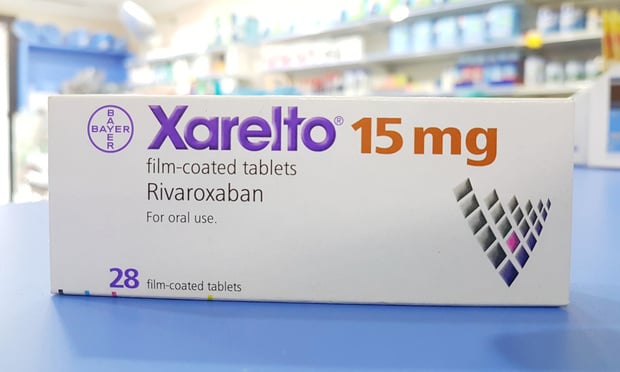Drug Companies Skipped Needed Testing, Plaintiffs Say in Latest Xarelto Trial
In a rush to bring Xarelto to market, drugmakers Bayer and Janssen Pharmaceuticals skipped needed testing that would have provided the basis for a more accurate warning label, plaintiffs counsel in the latest trial over the blood thinner told a Philadelphia jury Wednesday.
August 29, 2018 at 06:46 PM
4 minute read
 Photo: Shutterstock.com
Photo: Shutterstock.com
In a rush to bring Xarelto to market, drugmakers Bayer and Janssen Pharmaceuticals skipped needed testing that would have provided the basis for a more accurate warning label, plaintiffs counsel in the latest trial over the blood thinner told a Philadelphia jury Wednesday.
Pensacola, Florida, attorney Neil Overholtz of Aylstock, Witkin, Kreis & Overholtz told jurors during closing arguments in Cooney v. Janssen that, after learning about the efficacy and risks of a 20 milligram dose of the blood thinner, the defendants should have worked to develop a 10 milligram dose—a dose that Overholtz told jurors likely would not have caused the severe bleed that his client, Kevin Cooney, suffered while taking Xarelto.
“'Comfortable enough,'” Overholtz said, citing a Bayer email about whether its researchers should perform additional testing. “Is that what we want from our drug companies when they have a chance to find out more information?”
The arguments came in the third Xarelto trial that has been held in state court in Philadelphia, where there have been somewhat mixed results. Although the first trial, which was held late last year, ended in a $28 million award, that verdict was set aside by the trial court. Earlier this year, another Philadelphia jury rendered a defense verdict.
According to court records, more than 1,900 Xarelto cases are pending in the mass tort program in the Philadelphia Court of Common Pleas. The parties are currently in the process of wading through 12 cases to determine which cases should go to trial next year.
Although some of the theories have differed slightly, all of the cases are based on claims that Bayer and Janssen failed to adequately warn about the dangers of the blood thinner.
Cooney involves a man who was prescribed Xarelto after he suffered a pulmonary embolism. Soon after he was prescribed the drug, he suffered a severe bleed where he lost nearly one-third of his blood.
Overholtz told jurors during his closing arguments that internal emails from Bayer, which initially developed the drug, showed that some researchers believed there should have been more studies aimed at lower doses of the drug. He said the company didn't want to delay the drug's launch, fearing it could lose out on as much as $4 billion. The company, he said, only decided to study the lower doses when it became clear that Eliquis, a competing blood thinner, was set to hit the market after Xarelto's initial release.
Wilkinson Walsh + Eskovitz attorney Tamarra Matthews Johnson, who gave part of the closing arguments for the defendants, told jurors that Cooney had been in danger of suffering a fatal blood clot when he was prescribed the medication, and that his treating doctor properly weighed the risks of a serious bleed with the risk of another stroke. She also contended that the label adequately warned about the risks, and that the bleed Cooney suffered could have happened with any blood thinner.
Alexandra Walsh, also of Wilkinson Walsh, also told the jury that researchers had definitely considered additional testing of lower doses, and none of the emails were meant to be secretive. She said that any company would want to consider what additional testing may be needed, but, given the severity of the blood clots that Xarelto is meant to treat, the company did not feel that testing the efficacy of lower doses was needed at that time.
“When you push for a lower dose in patients with risk for [pulmonary embolism] and [deep vein thrombosis], people have more PE and DVT,” Walsh said.
In between the closing arguments, defendants made a motion for mistrial, saying the closing focused on theories regarding testing, rather than failure to warn, and that references Overholtz made to some defense witnesses having spoken in German prejudiced the jury.
Following the first trial, Bayer, citing social media posts and statements made during closing arguments, had argued that the plaintiffs counsel had attempted to link Bayer to Nazis in the minds of the jury. Although the verdict was later tossed for unrelated reasons, two lawyers were later punished for their social media posts.
On Wednesday, Judge Teresa Sarmina, who has overseen the three-week trial, denied the mistrial motion.
This content has been archived. It is available through our partners, LexisNexis® and Bloomberg Law.
To view this content, please continue to their sites.
Not a Lexis Subscriber?
Subscribe Now
Not a Bloomberg Law Subscriber?
Subscribe Now
NOT FOR REPRINT
© 2025 ALM Global, LLC, All Rights Reserved. Request academic re-use from www.copyright.com. All other uses, submit a request to [email protected]. For more information visit Asset & Logo Licensing.
You Might Like
View All
Plaintiff Argues Jury's $22M Punitive Damages Finding Undermines J&J's Talc Trial Win
4 minute read
'Discordant Dots': Why Phila. Zantac Judge Rejected Bid for His Recusal
3 minute read
Pittsburgh Jury Tries to Award $22M Against J&J in Talc Case Despite Handing Up Defense Verdict
4 minute read
Plaintiffs Seek Redo of First Trial Over Medical Device Plant's Emissions
4 minute readTrending Stories
- 1Eleven Attorneys General Say No to 'Unconstitutional' Hijacking of State, Local Law Enforcement
- 2Optimizing Legal Services: The Shift Toward Digital Document Centers
- 3Charlie Javice Fraud Trial Delayed as Judge Denies Motion to Sever
- 4Holland & Knight Hires Former Davis Wright Tremaine Managing Partner in Seattle
- 5With DEI Rollbacks, Employment Attorneys See Potential for Targeting Corporate Commitment to Equality
Who Got The Work
J. Brugh Lower of Gibbons has entered an appearance for industrial equipment supplier Devco Corporation in a pending trademark infringement lawsuit. The suit, accusing the defendant of selling knock-off Graco products, was filed Dec. 18 in New Jersey District Court by Rivkin Radler on behalf of Graco Inc. and Graco Minnesota. The case, assigned to U.S. District Judge Zahid N. Quraishi, is 3:24-cv-11294, Graco Inc. et al v. Devco Corporation.
Who Got The Work
Rebecca Maller-Stein and Kent A. Yalowitz of Arnold & Porter Kaye Scholer have entered their appearances for Hanaco Venture Capital and its executives, Lior Prosor and David Frankel, in a pending securities lawsuit. The action, filed on Dec. 24 in New York Southern District Court by Zell, Aron & Co. on behalf of Goldeneye Advisors, accuses the defendants of negligently and fraudulently managing the plaintiff's $1 million investment. The case, assigned to U.S. District Judge Vernon S. Broderick, is 1:24-cv-09918, Goldeneye Advisors, LLC v. Hanaco Venture Capital, Ltd. et al.
Who Got The Work
Attorneys from A&O Shearman has stepped in as defense counsel for Toronto-Dominion Bank and other defendants in a pending securities class action. The suit, filed Dec. 11 in New York Southern District Court by Bleichmar Fonti & Auld, accuses the defendants of concealing the bank's 'pervasive' deficiencies in regards to its compliance with the Bank Secrecy Act and the quality of its anti-money laundering controls. The case, assigned to U.S. District Judge Arun Subramanian, is 1:24-cv-09445, Gonzalez v. The Toronto-Dominion Bank et al.
Who Got The Work
Crown Castle International, a Pennsylvania company providing shared communications infrastructure, has turned to Luke D. Wolf of Gordon Rees Scully Mansukhani to fend off a pending breach-of-contract lawsuit. The court action, filed Nov. 25 in Michigan Eastern District Court by Hooper Hathaway PC on behalf of The Town Residences LLC, accuses Crown Castle of failing to transfer approximately $30,000 in utility payments from T-Mobile in breach of a roof-top lease and assignment agreement. The case, assigned to U.S. District Judge Susan K. Declercq, is 2:24-cv-13131, The Town Residences LLC v. T-Mobile US, Inc. et al.
Who Got The Work
Wilfred P. Coronato and Daniel M. Schwartz of McCarter & English have stepped in as defense counsel to Electrolux Home Products Inc. in a pending product liability lawsuit. The court action, filed Nov. 26 in New York Eastern District Court by Poulos Lopiccolo PC and Nagel Rice LLP on behalf of David Stern, alleges that the defendant's refrigerators’ drawers and shelving repeatedly break and fall apart within months after purchase. The case, assigned to U.S. District Judge Joan M. Azrack, is 2:24-cv-08204, Stern v. Electrolux Home Products, Inc.





